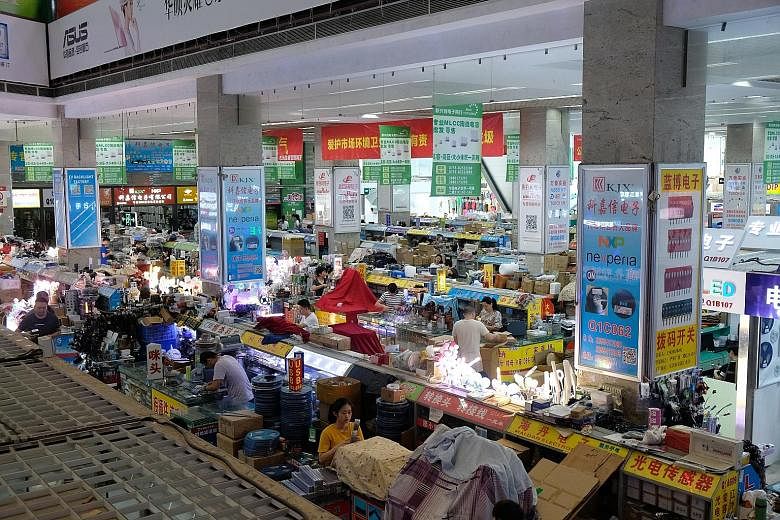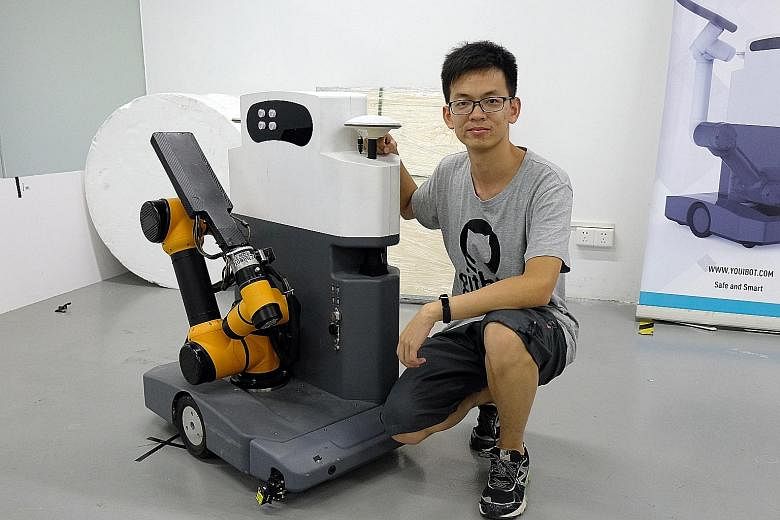Mr Zhao Wanqiu walks through the maze of stalls piled high with electronic components at one of Shenzhen's Huaqiangbei electronic markets, wearing a look of expectation.
The 24-year-old, who has been building machines such as small motor-powered boats and cars since he was in primary school, is looking for a small plug the size of a fingernail.
Spotting what he needs, he places an order for 10 of the tiny component - parts that will go into a new circuit board that is being designed.
"An hour later, it will be ready, and I can come and collect it," said Mr Zhao, a co-founder of Youibot, a Chinese start-up that makes robots.
This ease of obtaining virtually any electronic component isn't possible anywhere else in China, he said.
Mr Zhao is one of the many hardware entrepreneurs who have flocked to Shenzhen in recent years, drawn by the city's concentration of skilled suppliers, engineering talent and ease of obtaining components. "We can very conveniently and easily find parts and components we need, and so when we design new parts we can get them done quickly," he said.
Among the robots his company is building is one that can check bus tyres for punctures - a process which now requires workers to unmount and examine each tyre.
The firm is one of around 40 start-ups that Hax, an accelerator for hardware start-ups, accepts each year. Hax is perched atop Huaqiangbei Electronic World, one of a half dozen such malls in the area.
The accelerator, owned by American venture capital fund SOSV, invests in start-ups like Youibot and brings them to Shenzhen, where it says ideas can be developed faster than anywhere else in the world.
Hax managing director Duncan Turner said in terms of speed, Shenzhen cannot be beaten.
"You've got expert suppliers, supply chains for all of the components, the ability to specialise in certain areas - if you need a clean room or a particular testing requirement, all of that happens here. It is possible to do all of those things without coming to Shenzhen, it just takes a lot longer," said Mr Turner.
The city's transformation from a place once better known for knock-off iPhones and other counterfeit electronics into a hub for innovation can seem startling, but this journey has been years in the making.
The city's roots as a hub for manufacturing electronics began with economic reforms in 1978, which attracted manufacturers like Foxconn, that among other things, makes Apple products. Over time it became the manufacturing capital of the world, with 90 per cent of the world's electronics reportedly churned out by the city's factories.
But growing out of this manufacturing power was a culture of shanzhai or counterfeiting, where manufacturers collaborated to make copies of expensive gadgets.
One of these shanzhai manufacturers was Mr Robin Wu, known in Shenzhen as the "shanzhai king" for being the first to make a copy of the iPad when it was released.
He said many engineers and manufacturers honed their skills making copies in the noughties, sharing designs and improving on them.
"If we didn't have those years of imitation, the manufacturing industry would not have been able to achieve its Spring of today," said Mr Wu, now chief executive of MeeGoPad, a company that designs and makes gadgets like mini-PCs.
Mr David Li, founder of the Shenzhen Open Innovation Lab - which helps connect hardware start-ups from around the world with Shenzhen's suppliers - compared the city's development to Germany's in the late 1800s. Then, Germany was copying superior products made in the United Kingdom and selling them on the cheap in the UK and Europe. It forced the British to come up with the "Made in Germany" tag so consumers could differentiate.
"If you look at the development of modern industry, everyone started from copying. Now when you think 'Made in Germany', you think precision, high quality, good design and engineering, but it wasn't always so," he said, adding that Shenzhen is on a similar trajectory. Today, the city is home to some of China's biggest tech brands like drone-maker DJI and telecom equipment firm Huawei.
Mr Abhishek Agrawal, from Singapore start-up Kinexcs, which makes medical devices, finds Shenzhen's speed of growth mind-blowing: "Shenzhen is Singapore on steroids, things that would've taken me a month or two to do in Singapore I could finish in a day or two here."
Danson Cheong



